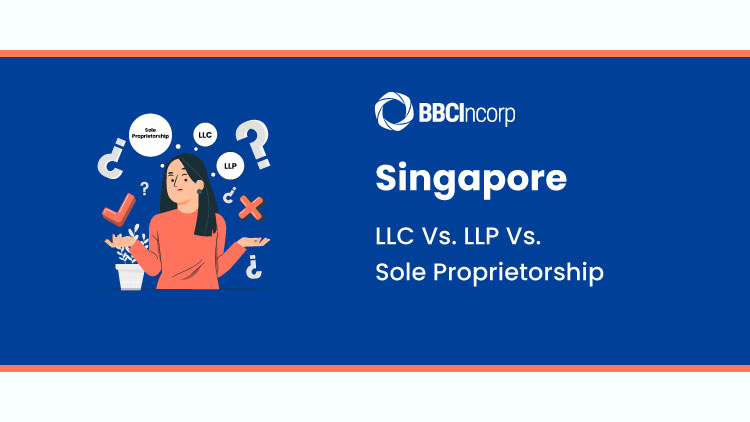
When it comes to incorporation in Singapore, entrepreneurs have many options for business types to aim for. Some can easily finalize their choices in no time before starting the registration process. And statistically, the three most common picks in Singapore are Limited Liability Company (LLC), Limited Liability Partnership (LLP), and Sole Proprietorship.
For those who are still confused and have not yet made up their mind, do not worry, BBCIncorp got your back! We put the three options in comparison in respect of their crucial aspects so that you can understand them clearly and subsequently choose the most suitable type for your business.
Common business structures in Singapore when incorporating
Limited liability company (LLC), in general, is the most chosen type of business entity in Singapore. LLC comprises many different specific subtypes. They are private and public limited liability companies:
- Private limited liability company (Pte. Ltd) is a company privately owned by no more than 50 shareholders.
- Public limited liability company is a company owned by more than 50 shareholders and it can be listed on stock exchanges. There is a public company limited by share and a public company limited by guarantee.
Limited liability partnership (LLP), on the other hand, is owned by at least 2 partners and it can be considered as a mix of partnership and limited liability companies.
Sole Proprietorship, lastly, is the simplest yet riskiest entity type to incorporate in Singapore as it is registered with one owner only.
Free ebook
Key matters for doing business in Singapore
Get all the details for doing business in Singapore with our guide

LLC vs LLP vs Sole Proprietorship in Singapore
Below is the comparison of the three registration options regarding legal status, liability, taxation, maintenance requirements, ownership transfer, perpetual succession, public perception, ability to raise capital, and dissolution.
Legal status
A sole proprietorship is not a separate legal entity, but an extension of the business owner.
On the other hand, an LLC and an LLP are separate legal entities from its owner, which means they are capable of:
- Suing and being sued under its name;
- Acquiring, owning, holding, developing, and disposing of property; and
- Entering contracts under its name.
Sole proprietorship has no distinctive status from its owner.
Liability
Both LLC and LLP follow a limited liability structure. It means that business owners of the two entities are shielded from the businesses’ debts.
In particular, shareholders in an LLC have liabilities limited only to their share value. However, an LLP is both owned and run by its partners. Therefore, a partner in an LLP may hold personal liability for their own wrongful act or negligence as well (but not for other partners).
By contrast, the owner of any sole proprietorship has unlimited liabilities for any business’s debts incurred in the course of its operation due to the fact that the entity has no separate legal status from its owner.
Summarise
- LLC: owners’ liability is limited to the amount of their shares.
- LLP: partners’ liability is limited to the amount of their investment.
- Sole proprietorship: owners’ liability is unlimited.
Taxation
The corporate tax rate imposed on an LLC is currently at 17%.
As for an LLP, different taxes are imposed on different types of partners:
- If partners are individual persons, they are taxed with personal income tax
- If partners are body corporate, they are taxed with corporate income tax
Meanwhile, the income of a sole proprietorship is taxed based on the owner. For example, if the owner is a person, then the income of that sole proprietorship is taxed progressively from 0% to 22%.
Summarise
- LLC: the company is subject to 17% flat tax rate.
- LLP: the individual partner pays tax on personal income while the corporate partner pays tax on shares of corporate income.
- Sole proprietorship: the profits are taxed at the owner’s personal income tax rates
Maintenance requirements
There are many compliance requirements that an LLC must comply with. The main obligations are to file annual returns to ACRA and annual tax returns to IRAS.
Prior to that, an Annual General Meeting must be held before a regulated deadline and much more else compliance work needs to be done. Due to the complexity of the requirements, an LLC is legally required to appoint at least one secretary to handle these tasks.
Regarding LLP, the requirements are much fewer. The main obligations of an LLP are to declare its solvency annually and to maintain all financial records.
Sole proprietorship has very minimal requirements. Nearly no obligations to comply with except for renewing and submitting tax returns with IRAS.
Summarise
- LLC: Heavy burden from maintenance requirements.
- LLP: Moderate burden from maintenance requirements.
- Sole proprietorship: Very light burden from maintenance requirements.
Other aspects
Ownership transfer, perpetual succession, public perception, and ability to raise capital are described in the following table:
| LLC | LLP | Sole Proprietorship | |
|---|---|---|---|
| Ownership | Share ownership can be partly or wholly transferred | Assets, licenses, and permits ownership are transferred individually | Ownership cannot be directly transferred |
| Perpetual succession | Changing members does not affect the existence, rights, or liabilities | Changing partners does not affect the existence, rights, or liabilities | No perpetual succession |
| Public perception | High | Moderate | Low |
| Capital raising | Easy capital raising due to credible identity | Difficult due to private finance contributions from partners | Difficult due to the owner’s private finance contribution |
Due to the clear regulations on ownership transfer and stable structure, LLC has a strong credibility, which helps this business type receive a good perception from the public and also from banks. Thus, an LLC has a higher chance to take out loans from banks or financial institutions, hence being able to raise its capital.
Dissolution
To declare dissolution, the three types of entities need to do the following:
- For LLC and LLP, conducting a striking-off or winding-up process.
- For sole proprietorship, filling the “Cessation of Business” online via Bizfile.
In summary
See the summary table below to go over the crucial aspects of an LLC, LLP, and a Sole Proprietorship in Singapore:
| LLC | LLP | Sole Proprietorship | |
|---|---|---|---|
| Legal status | Separate legal entity | Separate legal entity | No separate legal entity |
| Liability | Owners’ liability is limited to the amount of their shares. | Partners’ liability is limited to the amount of their investment. | Owners’ liability is unlimited. |
| Taxation | 17% | Personal and corporate tax income | Same as owner |
| Maintenance requirements | Heavy | Moderate | Very light |
| Ownership | Shares ownership can be partly or wholly transferred | Assets, licenses, and permits ownership are transferred individually | Ownership cannot be directly transferred |
| Perpetual succession | Changing members does not affect the existence, rights, or liabilities | Changing partners does not affect the existence, rights, or liabilities | No perpetual succession |
| Public perception | High | Moderate | Low |
| Capital raising | Easy capital raising due to credible identity | Difficult due to private finance contributions from partners | Difficult due to the owner’s private finance contribution |
| Dissolution | Striking off or winding up | Striking off or winding up | Filling “Cessation of Business” online via BizFile |
So, if you have a long-term plan to start a company and to expand it over time, then a limited liability company is the option to go for, since it follows clear regulations, has a stable structure, and it is also easier to raise capital for expansion.
If you want to do business with other partners while being shielded from the business’s debts and complying with only a few compliance requirements, then you should consider a limited liability partnership.
Or if you want to have absolute power over the business, a sole proprietorship can be a reasonable choice. However, please be aware of its limitations.
Should you have any related questions, or should you want to open your own company in Singapore, contact us now! BBCIncorp is your trusted company formation service provider in Singapore!
Disclaimer: While BBCIncorp strives to make the information on this website as timely and accurate as possible, the information itself is for reference purposes only. You should not substitute the information provided in this article for competent legal advice. Feel free to contact BBCIncorp’s customer services for advice on your specific cases.
Industry News & Insights
Get helpful tips and info from our newsletter!
Stay in the know and be empowered with our strategic how-tos, resources, and guidelines.





